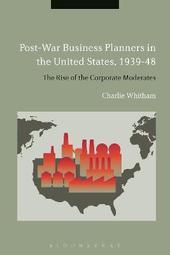
|
Post-War Business Planners in the United States, 1939-48: The Rise of the Corporate Moderates
Paperback / softback
Main Details
| Title |
Post-War Business Planners in the United States, 1939-48: The Rise of the Corporate Moderates
|
| Authors and Contributors |
By (author) Dr Charlie Whitham
|
| Physical Properties |
| Format:Paperback / softback | | Pages:304 | | Dimensions(mm): Height 234,Width 156 |
|
| Category/Genre | Political economy
Ownership and organization of enterprises |
|---|
| ISBN/Barcode |
9781350067271
|
| Classifications | Dewey:338.71 |
|---|
| Audience | | Tertiary Education (US: College) | |
|---|
|
Publishing Details |
| Publisher |
Bloomsbury Publishing PLC
|
| Imprint |
Bloomsbury Academic
|
| Publication Date |
19 April 2018 |
| Publication Country |
United Kingdom
|
Description
During the Second World War several independent business organizations in the US devoted considerable energy to formulating and advocating social and economic policy options for the US government for implementation after the war. This 'planning community' of far-sighted businessmen joined with academics and government officials in a nationwide endeavor to ensure that the colossal levels of productivity achieved by the US during wartime continued into the peace. At its core this effort was part of a wider struggle between liberals, moderates and conservatives over determining the economic and social responsibilities of government in the new post-war order. In this book, Charlie Whitham draws on an abundance of unpublished primary material from private and public archives that includes the minutes, memoranda, policy statements and research studies of the major post-war business planning organisations on a wide range of topics including monetary policy, demobilization, labor policy, international trade and foreign affairs. This is the untold story of how the post-war business planners - of all hues - helped shape the 'moderate' consensus which prevailed after 1945 over a permanent but limited government responsibility for fiscal, welfare and labor affairs, advanced American interests overseas and established.
Author Biography
Charlie Whitham is Senior Lecturer in American History at Edge Hill University, UK.
ReviewsDuring WW II, some US business leaders formed organizations to plan for the postwar economy and to provide social and economic policy options for the US government. A fundamental motivation was to avoid an economic relapse into the Great Depression and a desire to continue the massive US wartime production. Diplomatic historian Whitham (Edge Hill Univ., UK) meticulously examines these various organizations, especially the Committee for Economic Development (CED), National Planning Association (NPA), and Twentieth Century Fund (TCF) ... Drawing upon new archival material on the NPA and the TCF, Whitham depicts the tensions between "corporate liberals" and their New Deal vision of government involvement and business conservatives who espoused laissez-faire, which led to the emergence of "corporate moderates" in the CED that dominated the postwar years. * CHOICE * This is a timely book. America's in the midst of a political crisis, its financial system privileges the very wealthiest groups in society, and the lone superpower's global mission is challenged by the emergence of new powers. But where are its business organisations and intellectuals in crafting a new settlement at home and abroad that promotes the American dream, however limited it may be? Charlie Whitham's exhaustive new study examines the much more far-sighted generation of corporate liberals who emerged from the depths of depression and world war to shape a new order through concrete, history-making interventions that reimagined and re-engineered the economy, polity and state, yielding prosperity at home that sustained the New Deal political order for decades. It contains a rich, archive-based record from which the current globalised American financial community has much to learn. This is recommended reading for the intellectuals of the Right as much as the Democratic Left on how to shape a new order. * Inderjeet Parmar, City University London, UK * Based on rich new archival findings and many years of careful research, this exciting book demonstrates the large role of American corporate leaders in shaping the post-World War II world on economic, trade, and monetary issues. It first reveals the precise ways in which the ideas of the few "corporate liberals" in the business community were adapted and incorporated by the larger group of corporate moderates, who had the advice of leading university economists and several avenues of access to government decision-makers. In addition, it explains how these corporate moderates were able to fend off most liberal-labor initiatives as well as the plans put forth by arch-conservatives. * G. William Domhoff, University of California - Santa Cruz, USA *
|